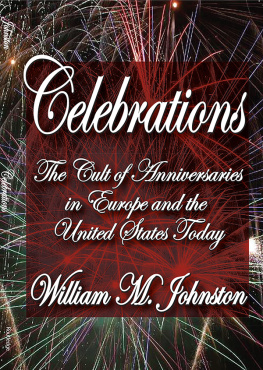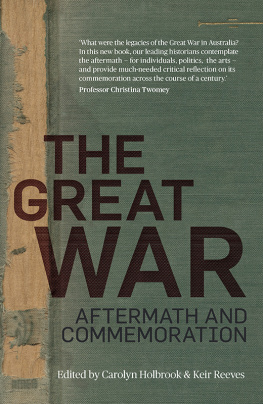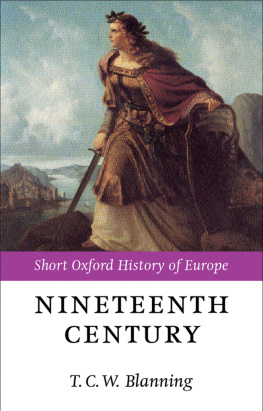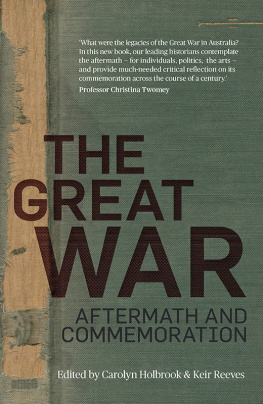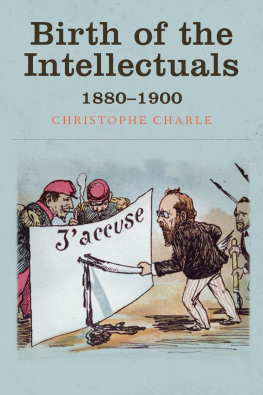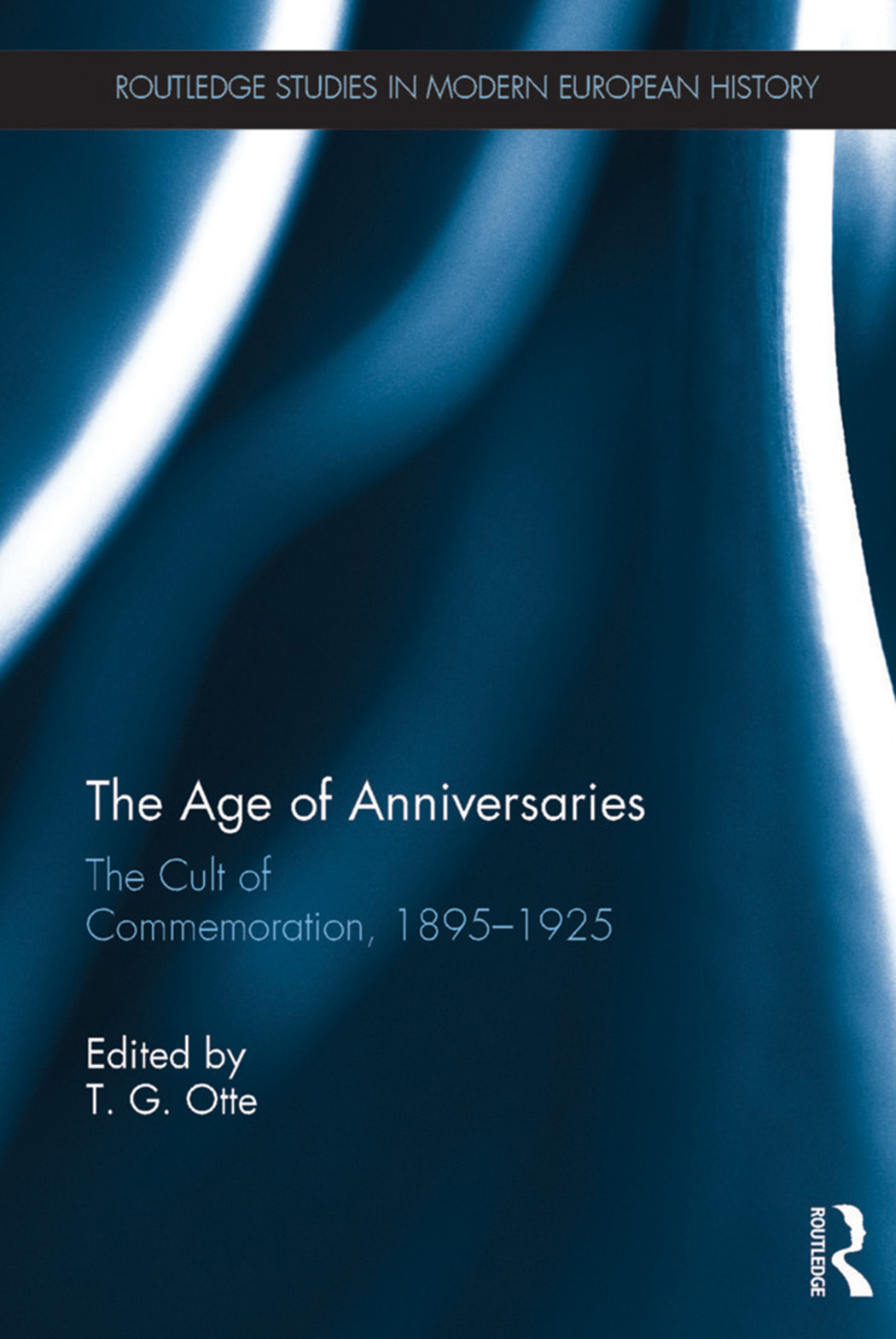Contents
The Age of Anniversaries
The Cult of Commemoration, 18951925
Edited by T. G. Otte

First published 2018
by Routledge
2 Park Square, Milton Park, Abingdon, Oxon OX14 4RN
and by Routledge
711 Third Avenue, New York, NY 10017
Routledge is an imprint of the Taylor & Francis Group, an informa business
2018 selection and editorial matter, T. G. Otte; individual chapters, the contributors
The right of T. G. Otte to be identified as the author of the editorial material, and of the authors for their individual chapters, has been asserted in accordance with sections 77 and 78 of the Copyright, Designs and Patents Act 1988.
All rights reserved. No part of this book may be reprinted or reproduced or utilised in any form or by any electronic, mechanical, or other means, now known or hereafter invented, including photocopying and recording, or in any information storage or retrieval system, without permission in writing from the publishers.
Trademark notice: Product or corporate names may be trademarks or registered trademarks, and are used only for identification and explanation without intent to infringe.
British Library Cataloguing-in-Publication Data
A catalogue record for this book is available from the British Library
Library of Congress Cataloging-in-Publication Data
A catalog record for this book has been applied for
ISBN: 978-1-4724-8879-4 (hbk)
ISBN: 978-1-315-17395-5 (ebk)
Typeset in Sabon
by codeMantra
The Age of Anniversaries
For historians centennial commemorations furnish an excellent heuristic tool for gauging late nineteenth- and early twentieth-century attitudes towards the past and the present. Centenary celebrations helped to revive, perpetuate and reinforce public perceptions of historical events and people in collective memory. They were fairly infrequent before 1850 but increased in size and numbers by the end of the long nineteenth century, so much so that a cult of the centenary had become established throughout the wider Western world around 1900. At one level, such events were ephemeral affairs, yet many left a lasting legacy. Above all, as part of the contemporary processes of the invention of traditions and the conscious national self-historicization of the established nation-states, they offer crucial insights into the social, cultural and political dynamics of the period.
T. G. Otte is Professor of Diplomatic History at the University of East Anglia, UK
Routledge Studies in Modern European History
For a full list of titles in this series, please visit www.routledge.com
40 Resistance Heroism and the End of Empire
The Life and Times of Madeleine Riffaud
Keren Chiaroni
41 The Summer Capitals of Europe, 18141919
Marina Soroka
42 German Reunification
Unfinished Business
Joyce E. Bromley
43 Oil Exploration, Diplomacy, and Security in the Early Cold War
The Enemy Underground
Roberto Cantoni
44 Divided Village
The Cold War in the German Borderlands
Jason B. Johnson
45 Propaganda, Persuasion and the Great War
Heredity in the modern sale of products and political ideas
Pier Paolo Pedrini
46 The Age of Anniversaries
The Cult of Commemoration, 18951925
Edited by T. G. Otte
47 The History of the European Migration Regime
Germanys Strategic Hegemony
Emmanuel Comte
48 Governing the Rural in Interwar Europe
Edited by Liesbeth van de Grift and Amalia Ribi Forclaz
Contents
T. G. OTTE
ERIK GOLDSTEIN
ANDREW LAMBERT
EWEN A. CAMERON
GEORGE GILBERT
GEOFFREY HICKS
CYNTHIA PACES
CHRISTINA THEODOSIOU
ROLAND QUINAULT
ANGELA BARTIE, LINDA FLEMING, MARK FREEMAN, TOM HULME AND PAUL READMAN
Ewen A. Cameron is Sir William Fraser Professor of Scottish History at the University of Edinburgh. He is the author of a number of works on the history of the Scottish Highlands and on modern Scottish politics, notably Impaled Upon a Thistle: Scotland since 1880 which was published in EUPs New Edinburgh History of Scotland in 2010.
George Gilbert is a Lecturer in Twentieth-Century History at the University of Southampton, having recently completed his Ph.D. at the University of East Anglia. His current research is concerned with the history of Russias radical right in the early twentieth century, the subject of his recent monograph The Radical Right in Late Imperial Russia: The Dreams of a True Fatherland? (2016).
Erik Goldstein is Professor of International Relations and history at Boston University. Among his publications are Winning the Peace: British Diplomatic Strategy; Peace Planning and the Paris Peace Conference, 19161920 (1991); Wars and Peace Treaties (1992); The First World Wars Peace Settlements, 19181925 (2002); and The Guide to International Relations and Diplomacy (2002).
Geoffrey Hicks is Senior Lecturer in Modern British History at the University of East Anglia. He has published widely on political history, particularly on the politics of British foreign policy.
Andrew Lambert is Laughton Professor of Naval History in the Department of War Studies at Kings College London and also director of the Laughton Naval History Unit there. Among his recent books are Nelson: Britannias God of War (2004); The Crimean War: British Grand Strategy against Russia 18531856 (2nd revised ed. 2011); and The Challenge: Britain against America in the Naval War of 1812 (2012).
T. G. Otte is Professor of Diplomatic History at the University of East Anglia. He has published some fifteen books, among most recently July Crisis: The Worlds Descent into War, Summer 1914 (2014) and (ed.), A Historian in Peace and War: The Diaries of Harold Temperley, 19001939 (2014).
Cynthia Paces is Professor of History at The College of New Jersey. The author of Prague Panoramas: National Memory and Sacred Space in the Twentieth Century, 1989: The End of the Twentieth Century, and numerous articles and book chapters, Paces is currently researching changing views of motherhood in fin-de-siecle Central Europe as well as contemporary debates about collective memory in the Czech Republic.
Roland Quinault is a Senior Research Fellow at the Institute of Historical Research, University of London. He was formerly Honorary Secretary of the Royal Historical Society and Reader in History at London Metropolitan University.
Paul Readman is Professor of Modern British History at Kings College London. Amongst his recent publications are Land and Nation in England: Patriotism, National Identity, and the Politics of Land, 18801914 (2008) and (ed.) Borderlands in World History, 17001914 (2014). Paul Readman, Angela Bartie (Edinburgh), Linda Fleming (Glasgow), Mark Freeman (UCL Institute of Education), Tom Hulme and Charlotte Tupman (both Kings College London) form the academic research team on the AHRC-funded research project, The Redress of the Past: Historical Pageants in Britain, 19052016. The project will result in a comprehensive database of historical pageants, a major book, articles, and an edited volume of essays situating the British movement in its international context. For details, see http://www.historicalpageants.ac.uk/.


